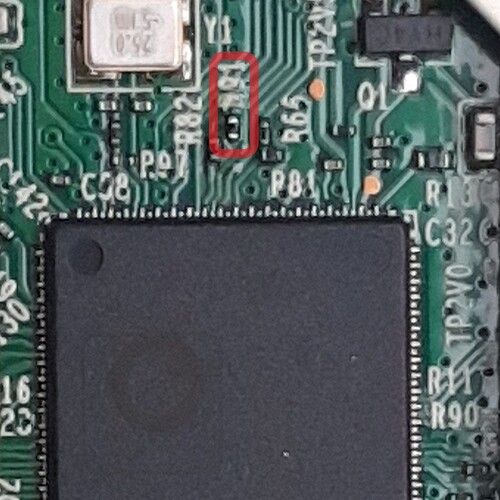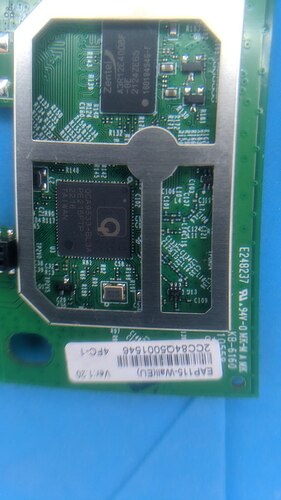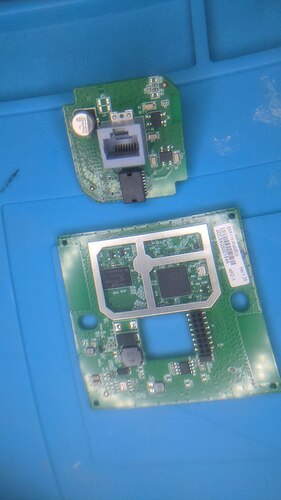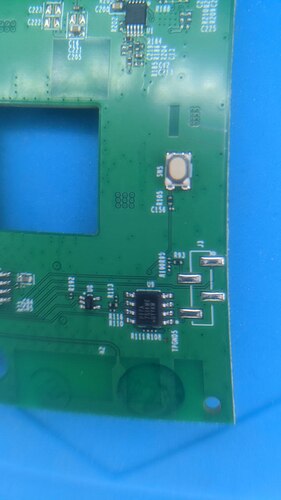B. Making debug port alive
There is placeholder for serial console 4-pin header (SMT not through hole). Additionally both TxD and RxD line have unpopulated serial resistors (accordingly R91 and R93). Serial port is by default configured to 115.2kbps transmission speed.
Serial console port
To make serial console solder R91 and R93 - use something in the range of 33R...100R)
C. Serial console boot
Finally at the point I could see something on serial console. Hope this is good starting point to understand device and its software architecture.
Activate terminal on host (Exit terminal: Ctrl + A + :quit ; Dump terminal content to file: Ctrl + A + :hardcopy -h <filename>). In my case I've used FTDI's FD4232H based USB to UART converter providing 4 serial channels.
> sudo screen /dev/ttyUSB0 115200
OEM firmware u-boot log and environmental variables
U-Boot 1.1.4--LSDK-10.2-00082-4 (Nov 7 2016 - 15:13:37)
board953x - Honey Bee 2.0DRAM:
sri
Honey Bee 2.0
ath_ddr_initial_config(195): (16bit) ddr2 init
tap = 0x00000003
Tap (low, high) = (0x4, 0x3b)
Tap values = (0x1f, 0x1f, 0x1f, 0x1f)
64 MB
Flash Manuf Id 0xc8, DeviceId0 0x40, DeviceId1 0x17
flash size 8MB, sector count = 128
Flash: 8 MB
*** Warning - bad CRC, using default environment
In: serial
Out: serial
Err: serial
Setting 0x181162c0 to 0x4081a100
Hit Ctrl+B to stop autoboot: 0
Net: ath_gmac_enet_initialize...
No valid address in Flash. Using fixed address
No valid address in Flash. Using fixed address
ath_gmac_enet_initialize: reset mask:c02200
Scorpion ---->S27 PHY*
S27 reg init
: cfg1 0x800c0000 cfg2 0x7114
eth0: 00:03:7f:09:0b:ad
athrs27_phy_setup ATHR_PHY_CONTROL 4 :1000
athrs27_phy_setup ATHR_PHY_SPEC_STAUS 4 :10
eth0 up
Honey Bee ----> MAC 1 S27 PHY *
S27 reg init
ATHRS27: resetting s27
ATHRS27: s27 reset done
: cfg1 0x800c0000 cfg2 0x7214
eth1: 00:03:7f:09:0b:ad
athrs27_phy_setup ATHR_PHY_CONTROL 0 :1000
athrs27_phy_setup ATHR_PHY_SPEC_STAUS 0 :10
athrs27_phy_setup ATHR_PHY_CONTROL 1 :1000
athrs27_phy_setup ATHR_PHY_SPEC_STAUS 1 :10
athrs27_phy_setup ATHR_PHY_CONTROL 2 :1000
athrs27_phy_setup ATHR_PHY_SPEC_STAUS 2 :10
athrs27_phy_setup ATHR_PHY_CONTROL 3 :1000
athrs27_phy_setup ATHR_PHY_SPEC_STAUS 3 :10
eth1 up
eth0, eth1
ath> printenv
bootargs=console=ttyS0,115200 root=31:02 rootfstype=jffs2 init=/sbin/init mtdparts=ath-nor0:256k(u-boot),64k(u-boot-env),2240k(rootfs),1408k(uImage),64k(mib0),64k(ART)
bootcmd=bootelf 0x9f040000
bootdelay=2
baudrate=115200
ethaddr=0x00:0xaa:0xbb:0xcc:0xdd:0xee
ipaddr=192.168.1.1
serverip=192.168.1.10
dir=
lu=tftp 0x80060000 ${dir}u-boot.bin&&erase 0x9f000000 +$filesize&&cp.b $fileaddr 0x9f000000 $filesize
lf=tftp 0x80060000 ${dir}board953x${bc}-jffs2&&erase 0x9f050000 +0x630000&&cp.b $fileaddr 0x9f050000 $filesize
lk=tftp 0x80060000 ${dir}vmlinux${bc}.lzma.uImage&&erase 0x9f680000 +$filesize&&cp.b $fileaddr 0x9f680000 $filesize
stdin=serial
stdout=serial
stderr=serial
ethact=eth0
Environment size: 689/65532 bytes
ath>
OEM kernel boot log
U-Boot 1.1.4--LSDK-10.2-00082-4 (Nov 7 2016 - 15:13:37)
board953x - Honey Bee 2.0DRAM:
sri
Honey Bee 2.0
ath_ddr_initial_config(195): (16bit) ddr2 init
tap = 0x00000003
Tap (low, high) = (0x5, 0x3b)
Tap values = (0x20, 0x20, 0x20, 0x20)
64 MB
Flash Manuf Id 0xc8, DeviceId0 0x40, DeviceId1 0x17
flash size 8MB, sector count = 128
Flash: 8 MB
*** Warning - bad CRC, using default environment
In: serial
Out: serial
Err: serial
Setting 0x181162c0 to 0x4081a100
Hit Ctrl+B to stop autoboot: 0
Loading .text @ 0x80248790 (4784 bytes)
Loading .rodata.str1.4 @ 0x80249a40 (212 bytes)
Loading .data @ 0x80249b20 (780083 bytes)
Clearing .bss @ 0x80308260 (4202512 bytes)
## Starting application at 0x80248790 ...
Booting QCA953x
[ 0.000000] Linux version 2.6.31 (jenkins@sohoiapbuild) (gcc version 4.3.3 (GCC) ) #1 PREEMPT Mon Sep 14 14:31:42 CST 2020
[ 0.000000] flash_size passed from bootloader = -1
[ 0.000000] CPU revision is: 00019374 (MIPS 24Kc)
[ 0.000000] ath_sys_frequency: cpu apb ddr apb cpu 650 ddr 393 ahb 216
[ 0.000000] Determined physical RAM map:
[ 0.000000] memory: 02000000 @ 00000000 (usable)
[ 0.000000] User-defined physical RAM map:
[ 0.000000] memory: 04000000 @ 00000000 (usable)
[ 0.000000] Zone PFN ranges:
[ 0.000000] Normal 0x00000000 -> 0x00004000
[ 0.000000] Movable zone start PFN for each node
[ 0.000000] early_node_map[1] active PFN ranges
[ 0.000000] 0: 0x00000000 -> 0x00004000
[ 0.000000] Built 1 zonelists in Zone order, mobility grouping on. Total pages: 16256
[ 0.000000] Kernel command line: console=ttyS0,115200 root=31:04 rootfstype=squashfs init=/init mtdparts=ath-nor0:128k(u-boot),64k(pation-table),64k(product-info),1536k(kernel),6144
k(rootfs),192k(config),64k(ART) mem=64M
[ 0.000000] PID hash table entries: 256 (order: 8, 1024 bytes)
[ 0.000000] Dentry cache hash table entries: 8192 (order: 3, 32768 bytes)
[ 0.000000] Inode-cache hash table entries: 4096 (order: 2, 16384 bytes)
[ 0.000000] Primary instruction cache 64kB, VIPT, 4-way, linesize 32 bytes.
[ 0.000000] Primary data cache 32kB, 4-way, VIPT, cache aliases, linesize 32 bytes
[ 0.000000] Writing ErrCtl register=00000000
[ 0.000000] Readback ErrCtl register=00000000
[ 0.000000] Memory: 62436k/65536k available (1755k kernel code, 3028k reserved, 461k data, 112k init, 0k highmem)
[ 0.000000] NR_IRQS:128
[ 0.000000] plat_time_init: plat time init done
[ 0.000000] Calibrating delay loop... 432.12 BogoMIPS (lpj=864256)
[ 0.084000] Mount-cache hash table entries: 512
[ 0.084000] NET: Registered protocol family 16
[ 0.088000] bio: create slab <bio-0> at 0
[ 0.096000] NET: Registered protocol family 2
[ 0.096000] IP route cache hash table entries: 1024 (order: 0, 4096 bytes)
[ 0.096000] TCP established hash table entries: 2048 (order: 2, 16384 bytes)
[ 0.096000] TCP bind hash table entries: 2048 (order: 1, 8192 bytes)
[ 0.096000] TCP: Hash tables configured (established 2048 bind 2048)
[ 0.096000] TCP reno registered
[ 0.096000] NET: Registered protocol family 1
[ 0.096000] ATH GPIOC major 0
[ 0.096000] squashfs: version 4.0 (2009/01/31) Phillip Lougher
[ 0.096000] msgmni has been set to 122
[ 0.096000] alg: No test for lzma (lzma-generic)
[ 0.096000] alg: No test for stdrng (krng)
[ 0.096000] io scheduler noop registered
[ 0.096000] io scheduler deadline registered (default)
[ 0.100000] Serial: 8250/16550 driver, 1 ports, IRQ sharing disabled
[ 0.100000] serial8250.0: ttyS0 at MMIO 0xb8020000 (irq = 19) is a 16550A
[ 0.100000] console [ttyS0] enabled
[ 0.364000] PPP generic driver version 2.4.2
[ 0.372000] NET: Registered protocol family 24
[ 0.376000] 7 cmdlinepart partitions found on MTD device ath-nor0
[ 0.384000] Creating 7 MTD partitions on "ath-nor0":
[ 0.388000] 0x000000000000-0x000000020000 : "u-boot"
[ 0.392000] 0x000000020000-0x000000030000 : "pation-table"
[ 0.400000] 0x000000030000-0x000000040000 : "product-info"
[ 0.408000] 0x000000040000-0x0000001c0000 : "kernel"
[ 0.412000] 0x0000001c0000-0x0000007c0000 : "rootfs"
[ 0.420000] 0x0000007c0000-0x0000007f0000 : "config"
[ 0.424000] 0x0000007f0000-0x000000800000 : "ART"
[ 0.432000] TCP cubic registered
[ 0.436000] NET: Registered protocol family 17
[ 0.440000] 802.1Q VLAN Support v1.8 Ben Greear <greearb@candelatech.com>
[ 0.448000] All bugs added by David S. Miller <davem@redhat.com>
[ 0.452000] athwdt_init: Registering WDT success
[ 0.460000] athwdt_timer_init: Starting WDT.
[ 0.472000] VFS: Mounted root (squashfs filesystem) readonly on device 31:4.
[ 0.480000] Freeing unused kernel memory: 112k freed
init started: BusyBox v1.20.2 (2020-09-14 14:37:29 CST)
starting pid 97, tty '': '/etc/rc.d/rcS >/dev/console 2>&1' [
NM_Debug](main) 01042: getopt_long: c=C
[NM_Debug](main) 01042: getopt_long: c=ý
[NM_Debug](main) 01125: excute the command: start=====>
[NM_Debug](nm_lock_init) 00149: create semaphore...
[NM_Debug](nm_lib_getProductInfoFromNvram) 00928: productinfo from NVRAM is (EAP115(TP-LINK|UN|N300-2):4.0
key=BgIAAAAkAABSU0ExAAQAAAEAAQDZtUNzD6KsxO4Tfx/Sp8S7w8TwPWwoppXy77wSPNs5WoV+Wr4kh09nu70vHVmSPji5KFUG+hmRjapsJsIJj+M0Zmd4EycKY8r0Ea3D4XO/uvloX4VHVPsDZkm8Krian5iNy6BgApVlebx0zQxto0GkgvPB
q1nhoZxJNapLghGO7w==
rsaKey=BgIAAACkAABSU0ExAAQAAAEAAQC33Ux/UTRSBo17Xm/eESv+2ZRoomAXfr1LIk2PbKmBLSldPpfeCH/m4rhY4wLiXqAke7DiRZkK6xjdahNG3uzffdaRZaxTjzY/UqsWJaqlP08Q+p1tF8YfqqeEn3WqCG6nVxmCvoIH8t3xTZQ8RgDNW
dO7v1IBARwN/8ffyjr4uQ==
HWID=7E639B5E49FED83E06C86CAB70E151EF
)
This Board use 2.6.31
[ 2.524000] xt_time: kernel timezone is -0000
[ 2.760000] nf_conntrack version 0.5.0 (1024 buckets, 30720 max)
[ 3.344000] ip_tables: (C) 2000-2006 Netfilter Core Team
[ 3.540000] Ebtables v2.0 registered
insmod: can't insert '/lib/modules/2.6.31/kernel/ts_kmp.ko': No such file or directory
insmod: can't insert '/lib/modules/2.6.31/kernel/br_filter.ko': No such file or directory
[ 3.672000] ---portal module open ok
[ 3.764000] Register vlan_manage hooks success.
insmod: can't insert '/lib/modules/2.6.31/kernel/statistics.ko': No such file or directory
[ 3.884000] [Debug gpio_parse_conf:271] Open File /etc/EAP115_4.0/gpio.conf SUCCESS!!
[ 3.932000] [Debug gpio_parse_conf:360] Ignore line (0), skipLen 14, readCount 256
[ 3.940000] [Debug gpio_parse_conf:360] Ignore line (0), skipLen 44, readCount 256
[ 3.948000] [Debug gpio_parse_conf:360] Ignore line (0), skipLen 6 , readCount 256
[ 3.952000] [Debug gpio_parse_conf:360] Ignore line (0), skipLen 7 , readCount 256
[ 3.960000] [Debug gpio_parse_conf:360] Ignore line (0), skipLen 2 , readCount 256
[ 3.968000] [Debug gpio_parse_conf:360] Ignore line (0), skipLen 7 , readCount 256
[ 3.976000] [Debug gpio_parse_conf:360] Ignore line (0), skipLen 44, readCount 256
[ 3.984000] [Debug gpio_parse_conf:360] Ignore line (0), skipLen 6 , readCount 256
[ 3.992000] [Debug gpio_parse_conf:360] Ignore line (0), skipLen 7 , readCount 256
[ 4.000000] [Debug gpio_parse_conf:360] Ignore line (0), skipLen 2 , readCount 256
[ 4.008000] [Debug gpio_parse_conf:360] Ignore line (0), skipLen 7 , readCount 256
[ 4.016000] [Debug gpio_parse_conf:360] Ignore line (0), skipLen 44, readCount 256
[ 4.024000] [Debug gpio_parse_conf:360] Ignore line (0), skipLen 7 , readCount 252
[ 4.032000] [Debug gpio_parse_conf:360] Ignore line (0), skipLen 6 , readCount 245
[ 4.040000] [Debug gpio_parse_conf:360] Ignore line (0), skipLen 6 , readCount 239
[ 4.048000] [Debug gpio_parse_conf:360] Ignore line (0), skipLen 6 , readCount 233
[ 4.056000] [Debug gpio_parse_conf:360] Ignore line (0), skipLen 2 , readCount 227
[ 4.064000] [Debug gpio_parse_conf:360] Ignore line (0), skipLen 51, readCount 225
[ 4.072000] [Debug gpio_parse_conf:360] Ignore line (0), skipLen 44, readCount 174
[ 4.080000] [Debug gpio_parse_conf:388] GPIO Parse OK: led_green led(1) high(1) high(1) 14
[ 4.088000] [Debug gpio_parse_conf:388] GPIO Parse OK: led_yellow led(1) high(1) low (0) 13
[ 4.096000] [Debug gpio_parse_conf:388] GPIO Parse OK: btn_reset btn(2) low (0) high(1) 17
[ 4.104000] [Debug btn_netlink_init:179] btn: create netlink socket SUCCESS.
[ 4.112000] [Debug wdt_module_init:249] Create watchdog proc dir SUCCESS.
[ 4.120000] [Debug led_entry_handler:765] Create led_green proc dir SUCCESS.
[ 4.128000] [Debug led_entry_handler:765] Create led_yellow proc dir SUCCESS.
[ 4.136000] [Debug btn_entry_handler:857] Init button: btn_reset 2 17 0 success.
[ 4.220000] rate_limit: module license 'BSD' taints kernel.
[ 4.224000] Disabling lock debugging due to kernel taint
[ 4.540000] [Debug btn_netlink_receive:72] BTN netlink with user space daemon 208 SUCCESS.
mesh is not supported
ap_watchdog is not supported.
Japan disaster mode is not supported
starting pid 226, tty '': '/sbin/getty ttyS0 115200'
[Debug checkLedParamValid:341] Param: mode off , delayon 0 , delayoff 0 , blinkCount 0.
[Debug checkLedParamValid:341] Param: mode off , delayon 0 , delayoff 0 , blinkCount 0.
[Debug checkLedParamValid:341] Param: mode repeat, delayon 200, delayoff 200, blinkCount 0.
[Debug checkLedParamValid:341] Param: mode repeat, delayon 200, delayoff 200, blinkCount 0.
[Debug checkLedParamValid:341] Param: mode off , delayon 0 , delayoff 0 , blinkCount 0.
[Debug checkLedParamValid:341] Param: mode off , delayon 0 , delayoff 0 , blinkCount 0.
[Debug checkLedParamValid:341] Param: mode repeat, delayon 500, delayoff 500, blinkCount 0.
[Debug checkLedParamValid:341] Param: mode repeat, delayon 500, delayoff 500, blinkCount 0.
[Debug checkLedParamValid:341] Param: mode off , delayon 0 , delayoff 0 , blinkCount 0.
[Debug checkLedParamValid:341] Param: mode off , delayon 0 , delayoff 0 , blinkCount 0.
[Debug checkLedParamValid:341] Param: mode off , delayon 0 , delayoff 0 , blinkCount 0.
[Debug checkLedParamValid:341] Param: mode repeat, delayon 200, delayoff 200, blinkCount 0.
[Debug checkLedParamValid:341] Param: mode off , delayon 0 , delayoff 0 , blinkCount 0.
[Debug checkLedParamValid:341] Param: mode on , delayon 0 , delayoff 0 , blinkCount 0.
[Debug checkLedParamValid:341] Param: mode off , delayon 0 , delayoff 0 , blinkCount 0.
[Debug checkLedParamValid:341] Param: mode blink, delayon 500, delayoff 500, blinkCount 4.
[Debug checkLedParamValid:341] Param: mode disable, delayon 0 , delayoff 0 , blinkCount 0.
[Debug checkLedParamValid:341] Param: mode enable, delayon 0 , delayoff 0 , blinkCount 0.
[Debug checkLedParamValid:341] Param: mode blink, delayon 200, delayoff 200, blinkCount 3000.
[Debug checkLedParamValid:341] Param: mode stop , delayon 0 , delayoff 0 , blinkCount 0.
[Debug checkLedParamValid:341] Param: mode off , delayon 0 , delayoff 0 , blinkCount 0.
[Debug checkLedParamValid:341] Param: mode repeat, delayon 4200, delayoff 800, blinkCount 0.
[Debug checkLedParamValid:341] Param: mode stop , delayon 0 , delayoff 0 , blinkCount 0.
LED_RESET
{ led_green off 1 0 0 0 }
{ led_yellow off 1 0 0 0 }
{ led_yellow repeat 1 200 200 0 }
{ led_green repeat 1 200 200 0 }
LED_UPDATE_START
{ led_green off 1 0 0 0 }
{ led_yellow off 1 0 0 0 }
{ led_yellow repeat 1 500 500 0 }
{ led_green repeat 1 500 500 0 }
LED_UPDATE_FINISH
{ led_yellow off 1 0 0 0 }
{ led_green off 1 0 0 0 }
LED_DUT_NO_CALDATA
{ led_green off 0 0 0 0 }
{ led_yellow repeat 4 200 200 0 }
LED_SYS_INIT_PROCESS
{ led_yellow off 0 0 0 0 }
{ led_green on 0 0 0 0 }
LED_SYS_INIT_OK
{ led_yellow off 0 0 0 0 }
{ led_green blink 0 500 500 4 }
LED_DISABLE_ALL
{ led_green disable 2 0 0 0 }
LED_ENABLE_ALL
{ led_green enable 0 0 0 0 }
LED_LOCATE
{ led_green blink 3 200 200 3000 }
LED_LOCATE_STOP
{ led_green stop 1 0 0 0 }
LED_ISOLATED_START
{ led_yellow off 0 0 0 0 }
{ led_green repeat 2 4200 800 0 }
LED_ISOLATED_FINISH
{ led_green stop 0 0 0 0 }
Into util_dbg_setMod, pModName(all), enable(1)
(none) mips #1 PREEMPT Mon Sep 14 14:31:42 CST 2020 (none)
[ 6.732000] [Debug led_proc_write:633] Write led_yellow.w client.
[Debug ledClien[ 6.740000] [Debug led_common_write_proc:472] Execute LED action: tEventHandler:110] GPIOD received led rule: LED_SYS_INIT_PROCESS.
{ 1 0 0 0 0 }
[ 6.804000] [Debug led_proc_write:633] Write led_green.
[ 6.808000] [Debug led_common_write_proc:472] Execute LED action: { 2 0 0 0 0 }
==============radio config============
radioType: 0x1
EIRP: 1
0. radioID:0
band:2
mimo:2
mimogain:3
anttgain:3
mode:7
chanlimit:0
dfsImproveSupp:0
thermalSupp:0
level[0] 0 0 0
level[1] 0 0 0
level[2] 0 0 0
level[3] 0 0 0
QCA HAL BB reg:
CCA: 0
00000000
AGC: 0
00000000
00000000
PSD 0
00000000
00000000
00000000
==============radio config============
<debug>_radio_region_init(): 218 @ read next region flag, parse finish
<debug>_radio_region_init(): 247 @ region:276, parse channel num:13
GBK essid(xxxxxxxxx)
UTF8 essid(xxxxxxxxx)
GBK essid(xxxxxxxxx)
UTF8 essid(xxxxxxxxx)
[ 8.872000] [Debug led_proc_write:633] Write led_green.
[Debug ledClien[ 8.880000] [Debug led_common_write_proc:472] Execute LED action: tEventHandler:110] GPIOD received led rule: LED_ENABLE_ALL.
{ 5 0 0 0 0 }
[ 8.896000] [NOTICE led_common_write_proc:509] pledconf->backup.mode 0 1
[ 9.008000] qca953x_GMAC: Length per segment 1536
[ 9.012000] 953x_GMAC: qca953x_gmac_attach
[ 9.016000] Link Int Enabled
[ 9.020000] qca953x_set_gmac_caps CHECK DMA STATUS
[ 9.024000] mac:0 Registering S27....
[ 9.028000] qca953x_GMAC: RX TASKLET - Pkts per Intr:18
[ 9.036000] qca953x_GMAC: RX TASKLET - Timer Freq r:376
[ 9.040000] qca953x_GMAC: RX TASKLET - Rx Desc :128
[ 9.048000] qca953x_GMAC: Mac address for unit 0:bfff0000
[ 9.052000] qca953x_GMAC: ff:ff:ff:ff:ff:ff
[ 9.056000] qca953x_GMAC: Max segments per packet : 1
[ 9.064000] qca953x_GMAC: Max tx descriptor count : 128
[ 9.068000] qca953x_GMAC: Max rx descriptor count : 128
[ 9.076000] qca953x_GMAC: Mac capability flags : 3581
[ 9.080000] 953x_GMAC: qca953x_gmac_attach
[ 9.084000] Link Int Enabled
[ 9.088000] qca953x_set_gmac_caps CHECK DMA STATUS
[ 9.096000] mac:1 Registering S27....
[ 9.100000] qca953x_GMAC: RX TASKLET - Pkts per Intr:18
[ 9.104000] qca953x_GMAC: RX TASKLET - Timer Freq r:376
[ 9.112000] qca953x_GMAC: RX TASKLET - Rx Desc :128
[ 9.116000] qca953x_GMAC: Mac address for unit 1:bfff0006
[ 9.120000] qca953x_GMAC: ff:ff:ff:ff:ff:ff
[ 9.128000] qca953x_GMAC: Max segments per packet : 1
[ 9.132000] qca953x_GMAC: Max tx descriptor count : 128
[ 9.140000] qca953x_GMAC: Max rx descriptor count : 128
[ 9.144000] qca953x_GMAC: Mac capability flags : 3D81
[ 10.104000] athr_gmac_ring_alloc Allocated 2048 at 0x83ad4000
[ 10.112000] athr_gmac_ring_alloc Allocated 2048 at 0x83b1a800
[ 10.416000] HONEYBEE ----> S27 PHY MDIO 20180115
[ 10.424000] Setting Drop CRC Errors, Pause Frames and Length Error frames
[ 10.432000] Setting PHY...
[ 14.960000] athr_gmac_ring_alloc Allocated 2048 at 0x82c25000
[ 14.964000] athr_gmac_ring_alloc Allocated 2048 at 0x83af6800
[ 15.272000] HONEYBEE ----> S27 PHY MDIO 20180115
[ 15.276000] ATHRS27: resetting s27
[ 15.380000] ATHRS27: s27 reset done
[ 15.396000] Setting Drop CRC Errors, Pause Frames and Length Error frames
[ 15.404000] Setting PHY...
[ 17.976000]
[ 17.976000] Disable VlanManage, data.enable(0), data.vid(1)
[ 17.984000] CJ++ for ath_spi_writeread get id 0xc8 0x16
[ 17.988000] CJ++ for ath_spi_writeread get id 0xc8 0x16
[ 17.992000] CJ++ for ath_spi_writeread get id 0xc8 0x16
[ 18.000000] CJ++ for mspi_read_id get id=0xc8
uid = 0x38 0x37 0x37 0x38 0x33 0xa 0x20 0x24 0x0 0x0 0x0 0x0 0x0 0x0 0x0 0x0
[NM_Debug](readFlashPublicKey) 00175: rsaKey=: BgIAAACkAABSU0ExAAQAAAEAAQC33Ux/UTRSBo17Xm/eESv+2ZRoomAXfr1LIk2PbKmBLSldPpfeCH/m4rhY4wLiXqAke7DiRZkK6xjdahNG3uzffdaRZaxTjzY/UqsWJaqlP08Q+
p1tF8YfqqeEn3WqCG6nVxmCvoIH8t3xTZQ8RgDNWdO7v1IBARwN/8ffyjr4uQ==!
Rsa verify success
[ 18.156000]
[ 18.156000] manage vlan set port: ssh (22), http (80), https (443)
[ 18.164000]
[ 18.164000] manage vlan set port: ssh (22), http (80), https (443)
[ 18.272000] CJ++ for ath_spi_writeread get id 0xc8 0x16
[ 18.276000] CJ++ for ath_spi_writeread get id 0xc8 0x16
[ 18.280000] CJ++ for ath_spi_writeread get id 0xc8 0x16
[ 18.288000] CJ++ for mspi_read_id get id=0xc8
uid = 0x38 0x37 0x37 0x38 0x33 0xa 0x20 0x24 0x0 0x0 0x0 0x0 0x0 0x0 0x0 0x0
[NM_Debug](readFlashPublicKey) 00175: rsaKey=: BgIAAACkAABSU0ExAAQAAAEAAQC33Ux/UTRSBo17Xm/eESv+2ZRoomAXfr1LIk2PbKmBLSldPpfeCH/m4rhY4wLiXqAke7DiRZkK6xjdahNG3uzffdaRZaxTjzY/UqsWJaqlP08Q+
p1tF8YfqqeEn3WqCG6nVxmCvoIH8t3xTZQ8RgDNWdO7v1IBARwN/8ffyjr4uQ==!
Rsa verify success
Generating 1024 bit rsa key, this may take a while...
[ 21.752000] __ath_attach: Set global_scn[0]
[ 21.772000] *** All the minfree values should be <= ATH_TXBUF-32, otherwise default value will be used instead ***
[ 21.780000] ACBKMinfree = 48
[ 21.784000] ACBEMinfree = 32
[ 21.788000] ACVIMinfree = 16
[ 21.804000] ACVOMinfree = 0
[ 21.804000] CABMinfree = 48
[ 21.808000] UAPSDMinfree = 0
[ 21.812000] ATH_TXBUF=512
[ 21.852000] SPECTRAL : get_capability not registered
[ 21.856000] HAL_CAP_PHYDIAG : Capable
[ 21.860000] SPECTRAL : Need to fix the capablity check for RADAR (spectral_attach : 231)
[ 21.880000] SPECTRAL : get_capability not registered
[ 21.884000] HAL_CAP_RADAR : Capable
[ 21.900000] SPECTRAL : Need to fix the capablity check for SPECTRAL
[ 21.900000] (spectral_attach : 236)
[ 21.920000] SPECTRAL : get_capability not registered
[ 21.924000] HAL_CAP_SPECTRAL_SCAN : Capable
[ 21.928000] SPECTRAL : get_tsf64 not registered
[ 21.932000] spectral_init_netlink 52 NULL SKB
[ 21.948000] SPECTRAL : No ADVANCED SPECTRAL SUPPORT
[ 21.952000] SPECTRAL :----- module attached
[ 21.960000] ath_get_caps[6261] rx chainmask mismatch actual 3 sc_chainmak 0
[ 21.992000] ath_get_caps[6236] tx chainmask mismatch actual 3 sc_chainmak 0
[ 22.004000] ath_attach_dfs[12758] dfsdomain 1
[ 22.052000] SPECTRAL : module already attached
[ 22.064000] ATH_RESERVED_TXBUF = 1000
[ 22.084000] ath_tx_paprd_init sc 82eb0000 PAPRD disabled in HAL
[ 22.256000] ath_attach_dfs[12758] dfsdomain 1
Interface doesn't accept private ioctl...
HALDbg (8BE0): Operation not permitted
[ 22.440000] wlan_vap_create : enter. devhandle=0x82ea02c0, opmode=IEEE80211_M_HOSTAP, flags=0x1
[ 22.460000] wlan_vap_create : exit. devhandle=0x82ea02c0, opmode=IEEE80211_M_HOSTAP, flags=0x1.
[ 22.480000] VAP device ath0 created
ath0
[ 22.492000] ath_attach_dfs[12758] dfsdomain 2
[ 22.848000]
[ 22.848000] DES SSID SET=xxxxxxxxx
[ 22.916000] Set beacon rate: 1000
[ 22.940000] Set bcast rate: 1000
[ 22.952000] Set mcast rate: 1000
[ 22.972000] Set mgmt rate: 1000
[ 22.992000] Set data minrate: 0
[ 23.012000] Set sta minrate: 1000
[ 23.052000] Set disable CCK rate: 0
[ 23.140000] VAP device ath1 created
ath1
[ 23.172000] ath_attach_dfs[12758] dfsdomain 2
[ 23.508000]
[ 23.508000] DES SSID SET=xxxxxxxxx
[ 23.576000] Set beacon rate: 1000
[ 23.600000] Set bcast rate: 1000
[ 23.612000] Set mcast rate: 1000
[ 23.632000] Set mgmt rate: 1000
[ 23.656000] Set data minrate: 0
[ 23.676000] Set sta minrate: 1000
[ 23.716000] Set disable CCK rate: 0
Public key portion is:
ssh-rsa AAAAB3NzaC1yc2EAAAADAQABAAAAgQC2W60HtEJY/tE3arzXmdgMw8qMsOnELy/C/91RqmKqMflecJFK+e0MRc43Y4n7LDUf8zsiVGWn+RBYioVEOjOxH6UKhzFkcZeteNWVdEv2jn/VfjP+uXy8Rxpxqf6vvuF9dc+f396DJHAI5jWO
6OaHkfCo8EpvWC6oACBOFNg0zQ== root@EAP115
Fingerprint: sha1!! 0e:b5:5d:20:39:57:8e:48:c8:5f:c7:da:60:87:7a:81:03:5c:12:c8
Generating 1024 bit dss key, this may take a while...
Reading topology file /tmp/topology1.conf ...
[ 24.496000] ieee80211_ioctl_siwmode: imr.ifm_active=393856, new mode=3, valid=1
[ 24.556000] ieee80211_ioctl_siwmode: imr.ifm_active=393856, new mode=3, valid=1
[ 24.672000]
[ 24.672000] manage vlan set ssid vlan: idx (0), intfName (ath0), vlan (0)
Mode: IEEE 802.11g Channel: 1 Frequency: 0 MHz
Using interface ath0 with hwaddr ac:84:c6:xx:xx:xx and ssid 'xxxxxxxxx'
[ 24.704000]
[ 24.704000] manage vlan set ssid vlan: idx (1), intfName (ath1), vlan (3)
[ 24.768000] [Debug led_proc_write:633] Write led_yellow.
[Debug ledClien[ 24.776000] [Debug led_common_write_proc:472] Execute LED action: tEventHandler:11 { 1 0 0 0 0 }
0] GPIOD received led rule: LED_SYS_INIT_OK.
[ 24.808000] [Debug led_proc_write:633] Write led_green.
[ 24.828000] [Debug led_common_write_proc:472] Execute LED action: { 3 0 500 500 4 }
[ 25.108000]
[ 25.108000] DES SSID SET=xxxxxxxxx
Mode: IEEE 802.11g Channel: 1 Frequency: 0 MHz
Using interface ath1 with hwaddr 0e:84:c6:xx:xx:xx and ssid 'xxxxxxxxx'
[ 25.552000]
[ 25.552000] DES SSID SET=xxxxxxxxx
l2_packet_receive - recvfrom: Network is down
l2_packet_receive - recvfrom: Network is down
[ 26.804000] CJ++ for ath_spi_writeread get id 0xc8 0x16
[ 26.808000] CJ++ for ath_spi_writeread get id 0xc8 0x16
[ 26.812000] CJ++ for ath_spi_writeread get id 0xc8 0x16
[ 26.820000] CJ++ for mspi_read_id get id=0xc8
uid = 0x38 0x37 0x37 0x38 0x33 0xa 0x20 0x24 0x0 0x0 0x0 0x0 0x0 0x0 0x0 0x0
[NM_Debug](readFlashPublicKey) 00175: rsaKey=: BgIAAACkAABSU0ExAAQAAAEAAQC33Ux/UTRSBo17Xm/eESv+2ZRoomAXfr1LIk2PbKmBLSldPpfeCH/m4rhY4wLiXqAke7DiRZkK6xjdahNG3uzffdaRZaxTjzY/UqsWJaqlP08Q+
p1tF8YfqqeEn3WqCG6nVxmCvoIH8t3xTZQ8RgDNWdO7v1IBARwN/8ffyjr4uQ==!
Rsa verify success
now ok to start tddp---------------------
[TDDP_DEBUG]<debug>[main:1290] tddp init---
uclite init ok, now startup eap-cs ---------------------
httpMudCreate: MUD 0x4cac40 was created
httpMudCreate: MUD 0x4cac40 was created
[utilities_debug: httpSystemFirmwareInit:271]register rpm
httpServerCreate------------------
[utilities_debug: httpSystemFirmwareInit:271]register rpm
httpServerCreate------------------
httpServerCreate: try to add port 22080
httpServerCreate: try to add port 80
route: SIOCDELRT: No such process
[UNIX_SOCK][unix_sock_connSrv:301]connect to file(/var/run/srv/22) failed after retry(0), errno(2):No such file or directory
[NTP_ERROR]<error>[_ntp_connect:556] connect host(192.168.1.1) failed:128(Network is unreachable)
[NTP_ERROR]<error>[_ntp_start:865] _ntp_connect failed
Public key portion is:
ssh-dss AAAAB3NzaC1kc3MAAACBAJw/Y8SS04NpdUofrGG/MhcGLQAVEsVlumVR/0LCJQ/JVvmWXP128Lew8XIPCO9OTbgZkKFOtUP/bgiUsDR0M2klEnbukdO7+uJLma1xYBRd54ugL5lXXZozlvjTy0YJnmmgvUd869V92Bm7cOmcaQG8/nUv
oKH3sKbfjcnkv5shAAAAFQCC8J7FPKfMnpv5kyXNItzD462xeQAAAIBkiuHvE3YybI6ykb80JcWMhlgJosXc76tO/sCmMnf0WChWHvW+38AxgcyM1RKXIYvpkj2+keg34Q3ra4FI+4NVETjJJ41KBXDRR7R56l6M3XuJuN2RhZOCTRzobFmwM8ZL
RxoB1XAQESErJU40yBVhtpJJn6tc3ScP+0/dZV0WFgAAAIBkGAoSLDNHsdU1Gae26JHeZZGaCWNzWPHB9tOm0akI5ntCVlY2b/+gfYGbDGeFXFDYsWxs/xMnw3b41rM1sdEjZp0Q6F9IgGHmK0/miypdMovTR3tjZcoLqcrsb1X9E8oTz8LGyxD0
MmaDteGpSyEaPOL331HH9YSIjYppe+1Tvg== root@EAP115
Fingerprint: sha1!! aa:6e:6f:49:b3:b4:23:b5:d3:ab:b6:0d:a1:89:f8:4d:37:3b:9f:b4
[WLAN_MONOTOR][ERR] no rx change
[ 38.960000] ACKTIMEOUT call ath_internal_reset begin
[ 38.972000] ACKTIMEOUT call ath_internal_reset end
wifi0 get_acktimeout:64
Into util_dbg_setMod, pModName(all), enable(1)
[NM_Debug](nm_region_getRegionName) 00192: Flash region info, code: 276, name: EU.
[WLAN_MONOTOR][ERR] no rx change
[ 92.988000] ACKTIMEOUT call ath_internal_reset begin
[ 93.000000] ACKTIMEOUT call ath_internal_reset end
wifi0 get_acktimeout:64
[NTP_ERROR]<error>[_ntp_connect:556] connect host(192.168.1.1) failed:128(Network is unreachable)
[NTP_ERROR]<error>[_ntp_start:865] _ntp_connect failed
[WLAN_MONOTOR][ERR] no rx change
[ 111.016000] ACKTIMEOUT call ath_internal_reset begin
[ 111.028000] ACKTIMEOUT call ath_internal_reset end
wifi0 get_acktimeout:64
First key information I retreived from this log is NOR Flash memory map:
Size Partition Address
+----------------+ 0x0080 0000
64kB | ART |
| |
+----------------+ 0x007f 0000
192kB | config |
| |
+----------------+ 0x007c 0000
| |
| |
| |
| |
6144kB | rootfs |
| |
+----------------+ 0x001c 0000
| |
| |
1536kB | kernel |
| |
+----------------+ 0x0004 0000
64kB | product-info |
| |
+----------------+ 0x0003 0000
64kB | pation-table |
| |
+----------------+ 0x0002 0000
| |
| |
128kB | u-boot |
| |
+----------------+ 0x0000 0000
OEM NOR Flash Memory Map
TP-Link EAP115(EU) v4
CPU variant and clocking frequencies
[ 0.000000] CPU revision is: 00019374 (MIPS 24Kc)
[ 0.000000] ath_sys_frequency: cpu apb ddr apb cpu 650 ddr 393 ahb 216
Next step would be to login by console or ssh client to make flash backup and dump yet another interesting files and logs...
If you want to see more progress someone need to replay in this thread - system won't allow me to post more consecutive posts




